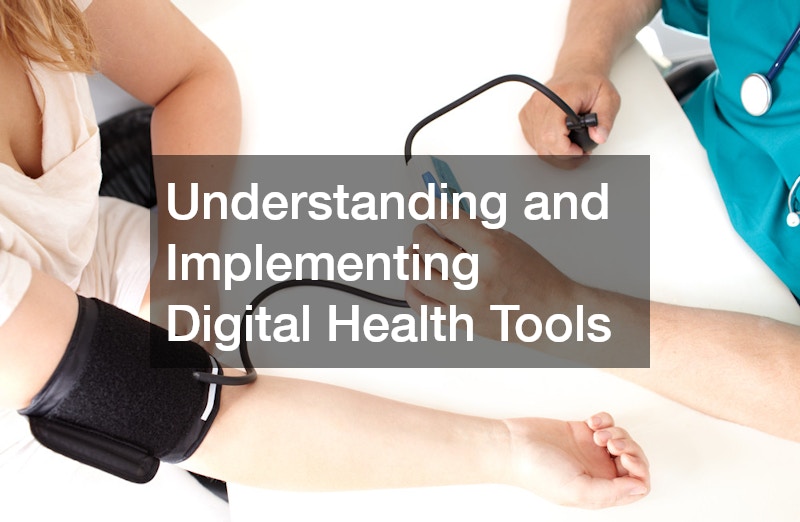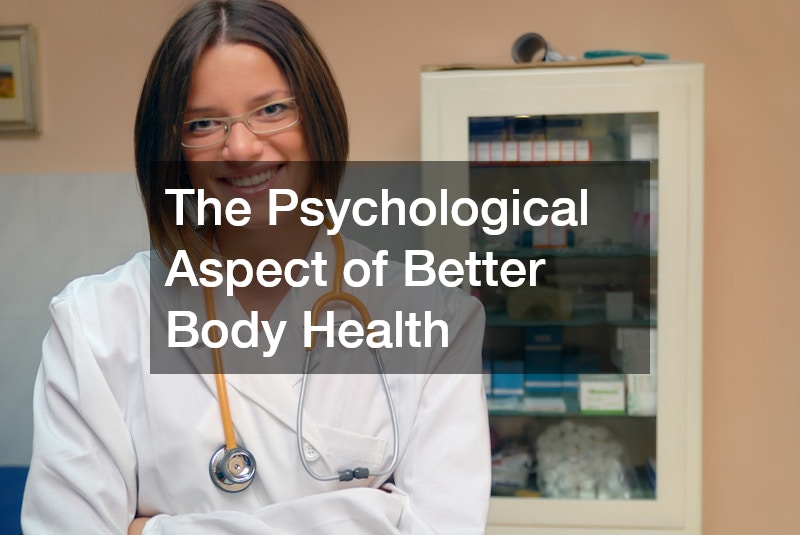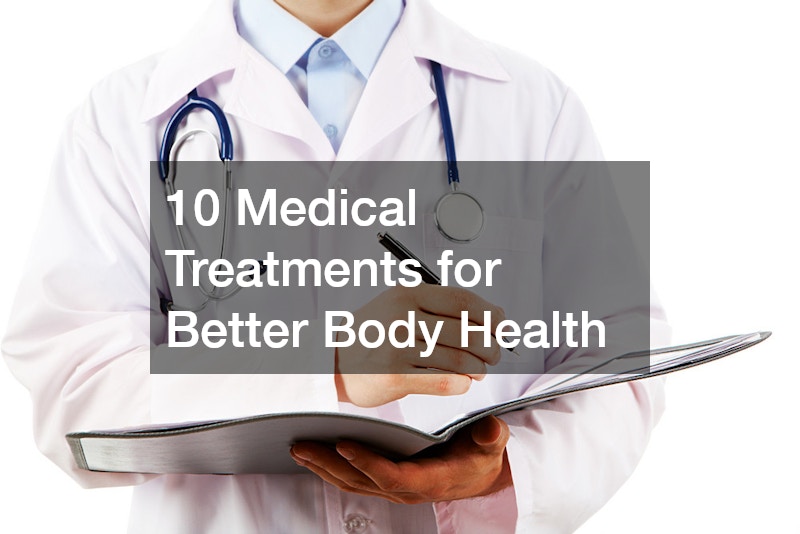In today’s fast-paced world, maintaining better body health is more crucial than ever. As people strive to keep up with their daily demands, the need to focus on physical well-being becomes vital. Better body health is not only about avoiding sickness but enhancing the overall quality of life.
With advancements in medical science, there are multiple treatments available that can aid in achieving better body health. These treatments encompass various aspects of health, including nutrition, exercise, and mental well-being. This article explores ten medical treatments that are instrumental in achieving better body health.
The Role of Nutrition in Better Body Health

Nutrition forms the cornerstone of better body health. Consuming a balanced diet rich in vitamins, minerals, and other essential nutrients can bolster the immune system, supporting overall well-being. A visit to a movement and disorder center can provide insights into how diet affects physical movement and coordination.
Proper nutrition can prevent chronic diseases and conditions such as obesity, diabetes, and heart disease. By consulting with nutrition specialists at a movement and disorder center, individuals can receive personalized dietary plans tailored to their specific health needs. These personalized plans can enhance bodily functions, ensuring better body health.
Furthermore, the importance of hydration cannot be overstated. Drinking sufficient water every day aids in digestion, nutrient absorption, and overall bodily function. Hydration works hand in hand with nutrition to maintain and improve body health.
How Regular Exercise Benefits Better Body Health
Including regular exercise in daily routines is one of the most effective methods to achieve better body health. Exercise not only helps in weight management but also improves cardiovascular health and boosts the immune system. Detox rehab centers often emphasize physical activity as a critical component of the recovery process for substance abuse.
Studies have shown that regular physical activity can reduce the risk of chronic diseases and improve mental health. Exercise releases endorphins, the body’s natural mood elevators, which can significantly reduce stress and anxiety. Detox rehab integrates exercise programs to promote a holistic healing approach.
Moreover, exercise enhances flexibility and strength, reducing the risk of injury and improving overall body functionality. Fitness plans offered at detox rehab can be tailored to suit individual needs, allowing for safe and effective physical health improvements.
The Impact of Sleep on Better Body Health
Sleep is one of the most essential foundations of better body health, yet it is often overlooked in fast-paced lifestyles. During sleep, the body undergoes critical processes such as tissue repair, memory consolidation, and hormone regulation. Without sufficient rest, both physical and cognitive performance decline, increasing the risk of accidents, poor decision-making, and long-term health conditions. Chiropractic care services often highlight the importance of correct spinal alignment and supportive sleeping postures, which directly influence sleep quality and overall comfort.
Chronic sleep deprivation has been strongly associated with obesity, diabetes, cardiovascular disease, and impaired immunity. In many cases, poor sleep is tied to musculoskeletal discomfort, such as back or neck pain, which prevents the body from fully relaxing at night. Chiropractors can provide targeted adjustments and lifestyle guidance that address these issues, allowing patients to rest more comfortably and wake up refreshed.
In addition to physical alignment, creating an environment conducive to sleep is equally important. A cool, dark, and quiet room, coupled with consistent bed and wake times, helps regulate circadian rhythms. Many chiropractic care services also recommend stress-reduction practices, such as stretching or breathing exercises, to calm the nervous system before bed. Together, these strategies encourage restorative rest and improved overall health.
Stress Management Techniques for Better Body Health

Stress management is increasingly recognized as a cornerstone of better body health, as prolonged stress can trigger a cascade of negative effects on both the body and mind. Elevated stress hormones, such as cortisol, contribute to conditions like hypertension, weakened immunity, and even digestive disorders. Urgent care clinics often stress the importance of managing these levels early on, helping patients avoid preventable visits for stress-related illnesses or flare-ups of chronic conditions.
A variety of stress-reduction methods can be incorporated into daily routines. Mindfulness meditation, deep breathing exercises, and yoga are proven to calm the nervous system and enhance mental clarity. Even consistent physical activity, such as walking or swimming, serves as a powerful outlet for stress release while simultaneously improving cardiovascular health. Urgent care clinics frequently provide educational resources on these practices, encouraging patients to adopt them as part of a healthier lifestyle.
Beyond self-care practices, professional interventions also play a crucial role. Cognitive-behavioral therapy (CBT), counseling, and group therapy can help individuals reframe thought patterns and develop healthy coping strategies. Many urgent care facilities partner with mental health professionals to offer referrals or integrated services. This collaboration ensures patients receive holistic care that promotes resilience, balance, and long-term well-being.
Integrative and Alternative Medicine
Integrative and alternative medicine continues to gain momentum as more people seek holistic ways to achieve better body health. Unlike a purely conventional model, this approach brings together the strengths of modern medical science with time-tested alternative practices. For example, when an emergency hospital incorporates integrative medicine into its patient care model, it provides a broader spectrum of healing tools. This not only addresses immediate medical concerns but also supports long-term recovery and overall wellness.
Acupuncture is a prime example, often used to alleviate chronic pain, reduce inflammation, and improve circulation. Massage therapy, yoga, and mindfulness practices are additional therapies that promote relaxation, stress reduction, and improved physical function. When offered alongside conventional treatments such as medication or surgery, these methods can accelerate recovery and enhance patient comfort.
A defining characteristic of alternative medicine is its emphasis on treating the root causes of illness rather than merely managing symptoms. This philosophy complements the precision of modern diagnostics, creating a more balanced approach. By valuing both evidence-based medical treatments and holistic practices, individuals benefit from comprehensive care. Integrating these methods fosters resilience, supports natural healing, and helps people maintain better body health in both preventative and rehabilitative contexts.
Importance of Regular Check-ups and Screenings
Regular medical check-ups and screenings are crucial for maintaining better body health because they provide a proactive approach to wellness rather than waiting for symptoms to appear. These evaluations can include blood pressure monitoring, cholesterol testing, cancer screenings, and immunizations, each designed to detect issues before they become severe. Early detection not only increases the chances of successful treatment but also reduces long-term healthcare costs by preventing complications.
A local dentist also plays an integral role in preventive care. Oral health is often described as a “window” to overall health, as conditions such as gum disease have been linked to systemic issues like heart disease, stroke, and diabetes. Through regular oral exams, a dentist can identify early warning signs of both dental and broader health problems, ensuring timely referrals to medical professionals when necessary.
In addition, routine dental visits reinforce good hygiene practices such as brushing, flossing, and dietary awareness. Preventive cleanings and examinations protect teeth and gums while contributing to overall well-being. By combining medical screenings with regular visits to a local dentist, individuals build a strong foundation for better body health, ensuring that both immediate concerns and long-term risks are addressed in a comprehensive, preventive manner.
Understanding and Implementing Digital Health Tools

Embracing digital health tools can significantly boost efforts toward achieving better body health. These resources, including wearable fitness trackers, smartwatches, and mobile health apps, give individuals the ability to monitor daily activity, sleep quality, heart rate, and even stress levels. By collecting real-time data, they provide valuable insights into personal health patterns and progress. Many platforms also offer goal-setting features and personalized recommendations, helping users stay motivated and accountable in their wellness journey.
Dental practices and other healthcare providers have also embraced digital tools, making it easier for patients to stay engaged with their care. Online portals now allow individuals to schedule appointments, receive reminders, access treatment updates, and even review medical records securely. This level of convenience ensures that patients remain consistent with checkups and follow-up care, reducing the risk of overlooked health concerns.
Furthermore, the integration of digital tools encourages ongoing communication between patients and healthcare providers. Whether through telehealth consultations, secure messaging, or shared progress reports, individuals can address questions or concerns more quickly. By combining technology with traditional healthcare methods, digital health tools foster a more proactive, informed, and empowered approach to managing health, ultimately supporting long-term better body health.
Role of Hydration in Better Body Health
Hydration is a fundamental aspect of maintaining better body health. Consuming adequate amounts of water daily supports essential bodily functions, including circulation, temperature regulation, and waste elimination. Local home health care services often emphasize the importance of hydration, especially in elderly care, where individuals may not always recognize the early signs of thirst.
Water also plays a vital role in digestion and nutrient absorption, helping the body break down food and transport vitamins and minerals to cells. Even mild dehydration can negatively affect energy levels, concentration, and physical performance. In more severe cases, dehydration can lead to serious complications such as kidney stones, urinary tract infections, and heat-related illnesses, underscoring the importance of consistent water consumption.
Caregivers can assist patients by monitoring daily fluid intake, offering reminders to drink water regularly, and providing alternatives like herbal teas or diluted fruit juices for those who struggle with plain water. Moreover, incorporating hydrating foods such as cucumbers, watermelon, oranges, and leafy greens into meals can further enhance fluid intake while delivering additional nutrients. Local home health care services often tailor hydration strategies to individual health conditions, ensuring that patients maintain balanced fluid levels as part of a comprehensive approach to better body health.
The Gut Microbiome and Its Influence on Health
The gut microbiome has a substantial impact on better body health, influencing digestion, immune function, and even mental health. A healthy gut microbiome can prevent disorders such as irritable bowel syndrome and inflammatory bowel disease. Collaborating with caregivers can ensure that you receive a diet rich in probiotics and fiber, both of which are vital for maintaining microbial balance.
Probiotics are beneficial bacteria that support gut health by promoting a balanced microbiome. Consuming probiotic-rich foods such as yogurt, kefir, sauerkraut, and other fermented products can enhance gut health, while prebiotic foods like bananas, oats, and garlic provide the fuel these microbes need to thrive. Caregivers can facilitate the adoption of healthy eating habits conducive to maintaining a robust microbiome by preparing balanced meals and encouraging consistent dietary patterns.
Furthermore, research suggests that the microbiome can affect mood and behavior, playing a role in psychiatric conditions such as anxiety and depression. This connection, often referred to as the “gut-brain axis,” demonstrates how intestinal health directly influences mental well-being. In addition, a strong microbiome boosts the immune system, reducing susceptibility to infections and chronic illness. Thus, focusing on gut health contributes to better body health by supporting digestion, immunity, and psychological resilience.
The Psychological Aspect of Better Body Health

The mind plays a vital role in achieving better body health. Psychological well-being can influence physical health, affecting everything from immunity to functionality. Addressing psychological issues like anxiety and depression through counseling and therapy is crucial for holistic health.
Chronic psychological stress can manifest physically, often leading to issues such as back pain and digestive problems. Seeking professional help through counseling centers or mental health services is recommended to address these psychological concerns.
Mindfulness and meditation are effective techniques for balancing the mind and promoting relaxation. Incorporating these practices into daily life can alleviate stress and contribute positively to better body health.
In summary, focusing on the holistic approach to better body health involves understanding and implementing various medical treatments and lifestyle changes. By paying attention to key aspects such as nutrition, exercise, stress management, and regular medical check-ups, individuals can significantly enhance their overall body health and well-being. Maintaining physical, mental, and emotional wellness is essential for a fulfilling and healthy life.
This comprehensive approach ensures that all facets of health are addressed, fostering a resilient and adaptable body. Individuals are encouraged to utilize available resources, including healthcare professionals and digital health tools, to support their journey towards better body health.

